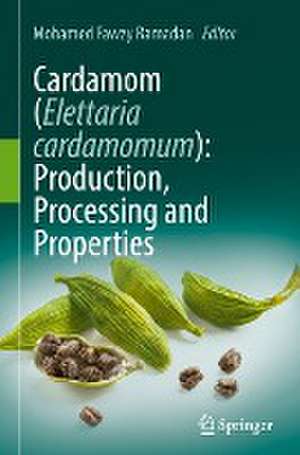Cardamom (Elettaria cardamomum): Production, Processing and Properties
Editat de Mohamed Fawzy Ramadanen Limba Engleză Hardback – 8 sep 2023
Preț: 1224.18 lei
Preț vechi: 1492.91 lei
-18% Nou
Puncte Express: 1836
Preț estimativ în valută:
234.27€ • 239.92$ • 194.88£
234.27€ • 239.92$ • 194.88£
Carte tipărită la comandă
Livrare economică 19 martie-02 aprilie
Preluare comenzi: 021 569.72.76
Specificații
ISBN-13: 9783031354250
ISBN-10: 3031354257
Ilustrații: XIV, 307 p. 85 illus., 42 illus. in color.
Dimensiuni: 155 x 235 mm
Greutate: 0.63 kg
Ediția:1st ed. 2023
Editura: Springer International Publishing
Colecția Springer
Locul publicării:Cham, Switzerland
ISBN-10: 3031354257
Ilustrații: XIV, 307 p. 85 illus., 42 illus. in color.
Dimensiuni: 155 x 235 mm
Greutate: 0.63 kg
Ediția:1st ed. 2023
Editura: Springer International Publishing
Colecția Springer
Locul publicării:Cham, Switzerland
Cuprins
Introduction to Cardamom (Elettaria cardamomum): Production, Processing, and Properties.-
Section 1. Cardamom: Cultivation, species, and cultivars.-
Cultivation and agricultural practices of cardamom.-
Cardamom botany, cultivars, and genetic diversity.-
Plant morphological traits of cardamom.-
Viral Diseases of Cardamom.- Cardamom wild genotypes .-
Section 2. Cardamom: Chemistry, functionality and health-promoting properties.-
Composition and functional properties of cardamom seeds.-
Composition and functional properties of cardamom essential oil.-
Composition and functional properties of cardamom fixed oil.-
Health aspects of true cardamom (Elettaria cardamomum): clinical evidence and proposed mechanism.-
Health-promoting effects of cardamom.-
Composition and functional properties of cardamom leaves.-
Chemistry and functionality of black cardamom (Amomum subulatum).-
Section 3. Cardamom: Technology, processing, and applications.-
Effect of processing on cardamom composition and properties.-
Cardamom-based beverages.-
Cardamom-based phytosomes.-
Cardamom Safety.-
Cardamom in food applications.-
Encapsulation of cardamom extract.-
Cardamom oleoresin.-
Non-food applications of cardamom
Notă biografică
Mohamed Fawzy Ramadan is a Professor of Food Chemistry at the Department of Clinical Nutrition, Faculty of Applied Medical Sciences, Umm Al-Qura University, Makkah, Saudi Arabia. Prof. Ramadan obtained his Ph.D. (Dr. rer. nat.) in Food Chemistry from the Berlin University of Technology (Germany, 2004). Prof. Ramadan continued his post-doctoral research at ranked universities such University of Helsinki (Finland), Max-Rubner Institute (Germany), Berlin University of Technology (Germany), and the University of Maryland (USA). In 2012, he was appointed Visiting Professor (100% teaching) in the School of Biomedicine, Far Eastern Federal University in Vladivostok, Russian Federation.
Prof. Ramadan published over 350 research papers and reviews in international peer-reviewed journals. He edited and published tens of books and book chapters (Scopus h-index is 45 and more than 7000 citations). He was an invited speaker at several international conferences. Since 2003, Prof. Ramadan is a reviewer and editor in several highly-cited international journals, such as the Journal of Medicinal Food and Journal of Advanced Research. He is currently the editor-in-chief of Journal of Umm Al-Qura University for Medical Science.
Prof. Ramadan received several national and international prizes, including Abdul Hamid Shoman Prize for Arab Researcher in Agricultural Sciences (2006), the Egyptian State Prize for Encouragement in Agricultural Sciences (2009), European Young Lipid Scientist Award (2009), AU-TWAS Young Scientist National Awards (Egypt) in Basic Sciences, Technology and Innovation (2012), TWAS-ARO Young Arab Scientist (YAS) Prize in Scientific and Technological Achievement (2013), and Atta-ur-Rahman Prize in Chemistry (2014).
Textul de pe ultima copertă
Cardamom [Elettaria cardamomum (L.) Maton is recognized for its unique taste and aroma. As the third most expensive spice after saffron and vanilla, Cardamom has been used as a spice and flavoring ingredient in food and is rich in bioactive constituents including minerals, carbohydrates, proteins, lipids, essential oils, terpenoids, flavonoids and carotenoids. Cardamom essential oil (CEO) and other bioactive compounds accumulated in cardamom capsules contribute to their characteristic aroma and utility as a novel food and nutraceutical. CEO from capsules possesses monoterpene constituents such as α-terpineol, 1,8-cineole, α-pinene, linalyl acetate, linalool, and nerolidol as well as the ester of α-terpinyl acetate. Flavonoids, anthocyanins, terpenoids, alkaloids, and other cardamom phenolics have shown high MIC values against Campylobacter species and reduced Bacillus subtilis spore. CEO loses its flavor rapidly upon storing under a normal environment. The change in the aroma or flavor could also cause changes in the constituents of its phytochemicals.Cardamom (Elettaria cardamomum): Production, Processing & Properties aims to create a multidisciplinary forum of discussion on E. cardamomum, emphasizing its botany, ethnobotanical, cultivation, horticultural practices, post-harvest, marketability, phytochemistry, extraction protocols, biochemistry, nutritional value, functionality, ethnomedicinal applications and and processing specifics. The book discusses the botanical distribution, phytochemical constituents, food applications and biological activities of cardamom capsule extracts and essential oil. Also, the text discusses the potential applications of E. cardamomum in food, cosmetics and pharmaceutical products. This book is the first of its kind, a full research work dedicated specifically to cardamom applications and benefits that will be of value for researchers from multiple fields.
Caracteristici
Provides a multidisciplinary forum of discussion on E. cardamomum
Discusses the potential applications of E. cardamomum in food, cosmetics and pharmaceutical products
A full research work dedicated specifically to cardamom applications and benefits
Discusses the potential applications of E. cardamomum in food, cosmetics and pharmaceutical products
A full research work dedicated specifically to cardamom applications and benefits
